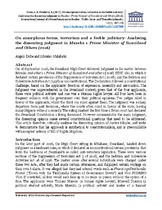On amorphous terms, terrorism and a feeble judiciary: Analysing the dissenting judgment in Maseko v Prime Minister of Swaziland and Others (2016)
Abstract
On 16 September 2016, the Swaziland High Court delivered judgment in the matter between Maseko and others v Prime Minister of Swaziland and others [2016] SZHC 180, in which it declared certain provisions of the Suppression of terrorism Act (2008); and the Sedition and Subversive Activities Act (1938) as unconstitutional. The Declaration followed a constitutional challenge, based on the applicants’ freedom of expression, assembly and association. The judgment was unprecedented in the Swaziland context, given that of the four applicants, three were political activists and one was a Human Rights lawyer. All four have been in frequent collision with the government over their political opinions. Two judges ruled in favour of the applicants, whilst the third one ruled against them. The judgment was a sharp departure from past decisions, where the courts often ruled in favour of the state, leaving many litigants without a remedy. The ruling marked the first time a Swazi court had declared the Swaziland Constitution a living document. However commendable the main judgment, the dissenting opinion raises several constitutional questions that need to be addressed. This article therefore, critically analyses the dissenting opinion of Justice Hlophe, and seeks to demonstrate that his approach is antithetical to constitutionalism, and is irreconcilable with accepted notions of Bill of Rights litigation.

